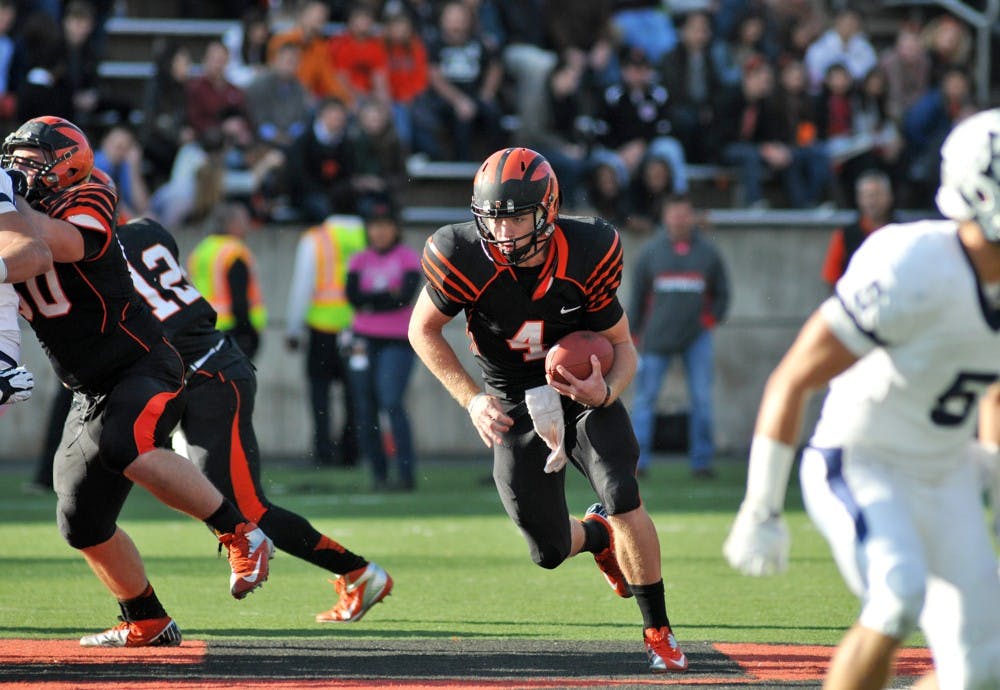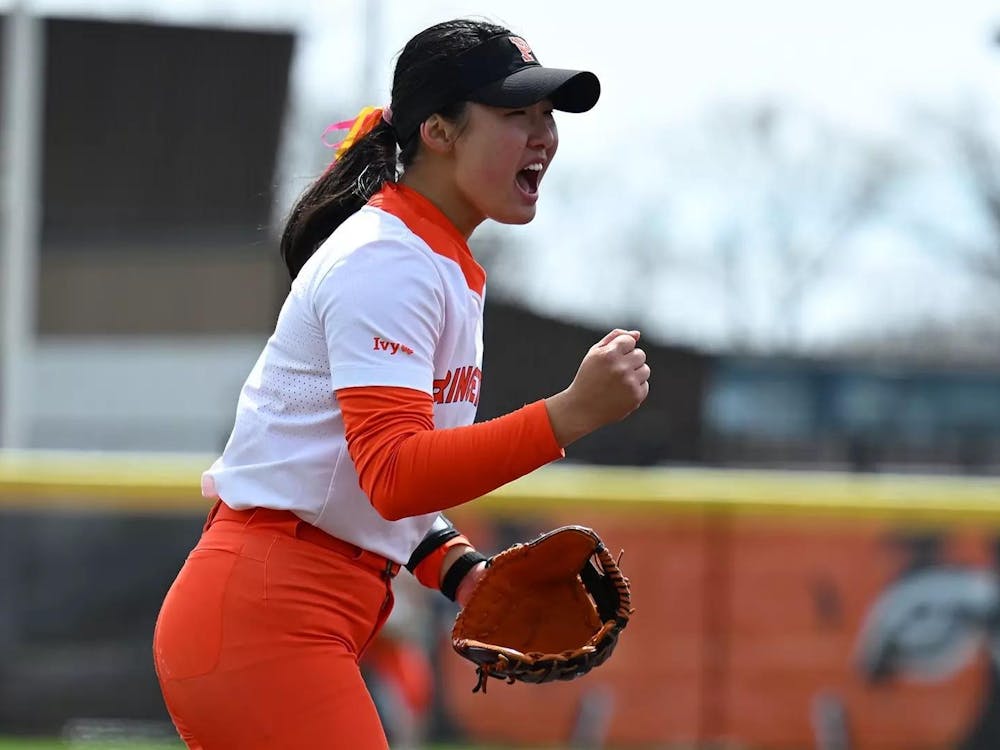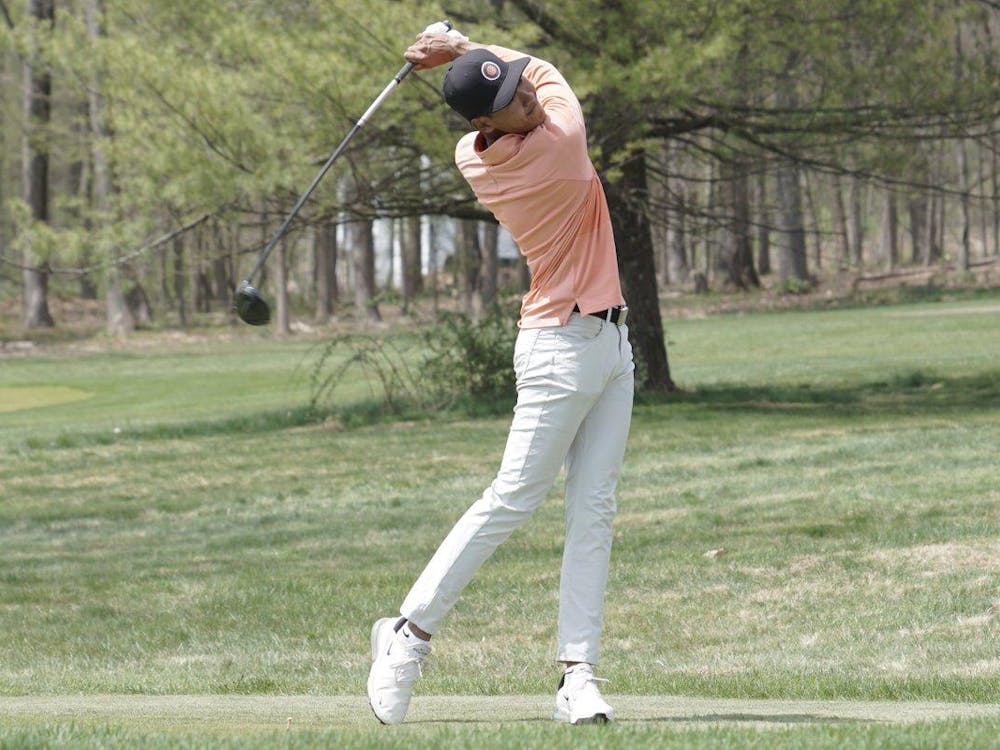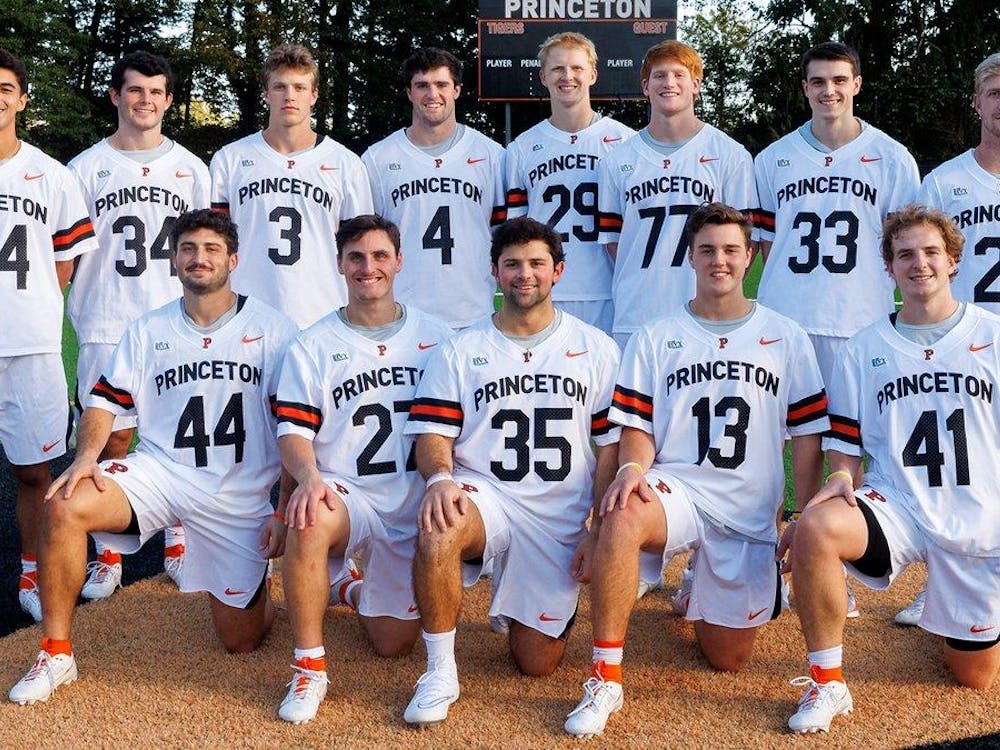Junior quarterback Quinn Epperly earned six Ivy League Offensive Player of the Week awards this season and was even named The Sports Network National Offensive Player of the Week after the football team’s 51-48 victory over Harvard. His FCS-record 29-straight completions earned him a shoutout from ESPN’s Twitter and later a national video feature on the network for the Capital One Cup Impact Performance of The Week.
Following his meteoric rise from bench player to touchdown machine, the Ivy League’s leading scorer has become the most talked-about name in the conference, but you wouldn’t know it from meeting him. His teammates use words like “humble,” “level-headed” and “low-key” to describe their quarterback. They never hear him curse, and he uses his spare time to organize small Bible studies with other players. He rejects the spotlight and tries to pass adoration from the media onto the rest of the team.
“I really try to not think about those things because I would never want an individual award to be the first thing on my mind,” he said. “Really I just feel like I’ve been blessed with playing in the system that I am … a lot of attention needs to go to some of the other guys that have put me in that spot.”
Junior receiver Connor Kelley, who was on the receiving end of five Epperly touchdown passes this season, admires his teammate’s ability to stay focused after suddenly finding himself in the limelight.
“The attention that he has received has not changed the way he has operated or conducted himself in the least, which is an attribute that I think has led to his success in the first place,” he said.
Epperly attributes his recent achievements to hard work, luck, his coaches and his teammates — just about everything except his own talents. He says he happened to gain some extra playing time only as a result of starting junior quarterback Connor Michelsen’s head injuries. When asked how he finally secured his starting role just before his triple overtime masterpiece at Harvard, he passes the credit off once again to the players around him:
“Because — I guess — of the efficiency of the offense when I was in, they decided I was gonna be the starter.”
Epperly’s humility does not tame his intensely competitive nature, though. According to his offensive coordinator and quarterback coach, James Perry, keeping Quinn motivated is an easy task even during a season filled with seemingly effortless blowout victories.
“It’s innate with Quinn,” he said. “The one thing that stood out to me even during his freshman year was his competitive drive.”
According to Epperly’s close friend, senior offensive lineman Mike Willis, the signal-caller’s motivation has been immune to both the good and the bad throughout his career.
“Quinn’s work ethic has never changed throughout his three years here, regardless of the situation,” Willis said. “That’s been true when he was a freshman and wasn’t playing much, as a sophomore, earlier in this season when he was [only] playing situationally in the red zone, and [even] now that he has had great individual success.”
Willis says that Quinn uses his dedication to self-improvement and his visible passion for the game — rather than his words — to inspire his teammates.

“I’ve always been impressed by how the team has mirrored his work habits as he’s been our quarterback,” Willis said. “Sometimes I joke that during games he sprints off the field in his signature jet plane celebration style, but it’s hard to actually make fun of him because his excitement for the game is so contagious that he rallies the whole team around him.”
Epperly’s relentless desire to help his team win leaves him with a different perception of the game than traditional quarterbacks.
“I don’t really look at it as far as [being] just a runner or a thrower, but just trying to be an overall football player,” he said. “I try to do well with any opportunity … any role that they give me, whether it’s blocking, catching, running, or throwing.”
The gunslinger’s propensity to embrace contact rather than shy away from it can be traced back to his youth football days. Beginning at age six, Epperly played running back until one of his middle school coaches decided to move him to quarterback. The reasoning behind the switch seemed almost arbitrary at the time, but it would foreshadow Epperly’s future role in Princeton’s revolutionary three-quarterback offense: he had lost the battle for starting running back and the coach simply wanted an excuse to keep him in the backfield.
The Knoxville, Tenn. native continued to play quarterback at Christian Academy, where he was ironically never allowed to execute a designed run. Epperly began seeking college recruitment as a conventional pocket passer from a number of big-name schools, including Texas A&M.
Epperly shined at Texas A&M’s high school football camp and caught the eyes of the coaching staff. They informed Epperly that they had just promised their last quarterback spot to someone else, but they were impressed enough to make a few phone calls on his behalf — including to Princeton. Epperly, who had never previously considered the Ivy League, knew his future had been changed forever by the connections he forged at that camp. Two years later, his conception of the event was put into new context: While watching the Heisman Trophy presentation from a Princeton dorm room, he realized the recruit who had beaten him to the A&M scouts was Aggies star Johnny Manziel.
When the 6-foot-1, 220-pound quarterback finally arrived at Princeton, in August 2011, he had no idea how much his playing style would change. Perry was working hard to increase the tempo of his Tigers’ offense. He thought Epperly needed to improve his skills as a passer, but saw potential in his rushing abilities. He eased the freshman into action, using him sparingly in goal-line situations and later as a running back while Michelsen took the snaps.
Perry was impressed with the confusion that placing two quarterbacks in the backfield caused for opposing defenses. Following the acquisition of sophomore quarterback Kedric Bostic during Epperly’s second season, Perry began toying with different versions of the three-quarterback set the team perfected this fall. Epperly’s passing abilities were still less reliable than Michelsen’s, but Perry felt his athleticism was too valuable to keep on the bench.
“As far as putting your best 11 players on the field — it just didn’t make sense to me that you had to play one quarterback,” Perry said.
Epperly feels Perry has had a greater influence than anyone on his growth as a football player.
“The main thing that Coach Perry looks for is someone that he knows is gonna work hard and that will play through some pain. I think that’s where he really develops respect,” said Epperly. “Freshman year … I was handled to develop some very tough skin.”
”I think it’s really helped me … in game situations where things may not go right,” he added.
Senior center Joe Goss contends that Epperly’s maturity and mental toughness has helped him overcome adversity on the field.
“Quinn is particularly level-headed and next-play oriented,” he said. “Should something go wrong, say with the offensive line for example, his focus is always on the next play from scrimmage.”
Looking back, the junior cites the last game of his freshman year as a turning point in his relationship with Perry. Epperly separated his throwing shoulder during the first series of the game before tearing a ligament in his foot one quarter later. Turning toward the sideline, the freshman glanced at his mentor for guidance.
“I remember him … just being like, ‘Well, we’ll see how tough you are’, and that kinda got me going,” Epperly said. “I tried to prove myself … I was gonna stay in until they decided otherwise.”
Willis feels that the toughness Epperly has developed throughout his career is reflected in his playing style and transcends the value of his talent alone.
“Especially in the red zone when the other team is sure he’s gonna get the ball, his attitude as a runner speaks to his attitude as a competitor,” Willis said. “There are lots of quarterbacks who aren’t willing to put their head down and grind through the line of scrimmage to get those tough yards … His mental edge sets him apart from other people who would be able to — in theory — be just as good as he is at running.”
Epperly’s grit has helped him battle through a plethora of injuries during his three years. During the final three weeks of the offseason preceding his most successful year, Epperly found himself bedridden with mononucleosis. When he finally decided to go to the hospital, his doctor said his spleen had become so dangerously enlarged that he would have to miss training camp and possibly entire football season. Epperly laughed and promised he would be on the field. At the first day of camp he was dizzy and suffering from body cramps — but he was playing.
13 weeks later, the quarterback has racked up 25 touchdowns through the air and another 18 on the ground. He is responsible for an average of 26.6 points per game — more than the 24.6 per game that entire opposing teams have posted against Princeton this year. He leads the team in both passing and rushing, averaging 213.7 and 57 yards per contest respectively.
Epperly’s multifaceted value is difficult to capture in a single stat - statisticians are rarely faced with players who score so many touchdowns while throwing, rushing and receiving. Fantasy football gurus may have a greater appreciation than the average fan for just how mind-boggling the quarterback’s numerical contributions have been. By the default scoring format used in standard ESPN.com and NFL.com leagues (allowing for fractional points), Epperly had averaged a jaw-dropping 34.6 fantasy points per game through ten games; Peyton Manning currently leads the NFL with just 24.6.
With 10 games remaining in his Princeton career, the junior says post-grad life is too far in the future for him to begin seriously evaluating his chances of playing professionally.
“I mean, if I was presented the opportunity I would do that in a heartbeat,” he said. “I think realistically right now that I would have to improve on a lot of things before that would even become a possibility; mainly my arm and my mechanics and being a pocket passer would have to improve greatly.”
Epperly added that he would embrace the chance to play in professional leagues anywhere, not just in the NFL. When asked about his on-and-off-the-field role model Tim Tebow’s refusal to accept a role besides quarterback, he said that was the one place where their philosophies diverged.
“Any position,” he said. “I would do anything to keep playing football.”
The magical journey Epperly has taken this year’s Tigers on ended in a disappointing loss — along with the Ivy championship. Competitor that he is, he says he was “furious” after the game.
“It will always kind of tarnish the season a little bit for me, but looking back on it now after a couple days removed from the game, it was an awesome season,” he said. “It was a huge blessing to be a part of and I’m really glad that I was able to be on what will probably be seen as such a historic, great team.”









